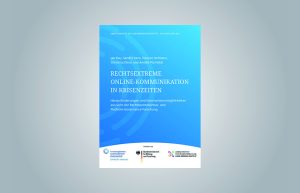Der Report wirft ein aktuelles Schlaglicht auf die Herausforderungen durch den (digitalen) Rechtsextremismus im Kontext der Corona-Krise und der Bundestagswahl 2021. Es werden zentrale Erkenntnisse der Rechtsextremismus- mit der Platform Governance-Forschung zusammengeführt und Möglichkeiten aufgezeigt, wie diesen Herausforderungen begegnet werden kann.
 In Teil I des Reports wird herausgearbeitet, wie rechtsextreme Internetkommunikation und deren Gewaltpotenzial den demokratischen Willensbildungsprozess beeinflussen. Anschließend werden aktuelle Entwicklungen und Spannungspunkte, insbesondere im Hinblick auf die Corona-Krise und den Bundestagswahlkampf 2021, dargestellt. Thematisiert werden Krisen als Möglichkeitsraum rechtsextremer Kommunikation, der Aufstieg alternativer Plattformen, die zunehmende Relevanz von Infrastrukturanbietern bei der Inhaltsmoderation und der ungenügende Datenzugang für Forschende.
In Teil I des Reports wird herausgearbeitet, wie rechtsextreme Internetkommunikation und deren Gewaltpotenzial den demokratischen Willensbildungsprozess beeinflussen. Anschließend werden aktuelle Entwicklungen und Spannungspunkte, insbesondere im Hinblick auf die Corona-Krise und den Bundestagswahlkampf 2021, dargestellt. Thematisiert werden Krisen als Möglichkeitsraum rechtsextremer Kommunikation, der Aufstieg alternativer Plattformen, die zunehmende Relevanz von Infrastrukturanbietern bei der Inhaltsmoderation und der ungenügende Datenzugang für Forschende.
Darauf aufbauend werden in Teil II die Herausforderungen durch den (digitalen) Rechtsextremismus im Forschungsfeld der Platform Governance verortet: Es werden grundsätzliche Kriterien für die Schaffung und Durchsetzung eines angemessenen Ordnungsrahmens herausgearbeitet und mögliche Maßnahmen und Interventionen im Umgang mit dem Phänomen benannt. Diese umfassen unter anderem eine Stärkung von Transparenz, eine Stärkung demokratischer Narrative und Akteur*innen und eine Reduzierung der Sichtbarkeit rechtsextremistischer Narrative und Akteur*innen.
Rau, Jan; Kero, Sandra; Hofmann, Vincent; Dinar, Christina; Heldt, Amélie Pia (2022): Rechtsextreme Online-Kommunikation in Krisenzeiten. Herausforderungen und Interventionsmöglichkeiten aus Sicht der Rechtsextremismus- und Platform-Governance-Forschung. Hamburg: Hans-Bredow-Institut, März 2022 (Arbeitspapiere des Hans-Bredow-Instituts | FGZ Resultate Nr. 62), DOI: https://doi.org/10.21241/ssoar.78072 (pdf).

